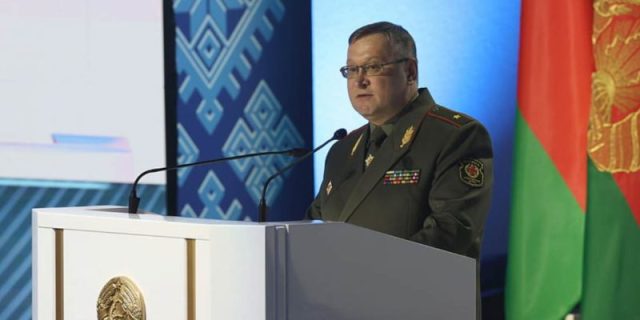On September 22, a meeting of the OSCE Security Cooperation Forum (FSB) "Modern Risks and Challenges of Military Security"was held in Vienna (Austria).
On behalf of the Belarusian side, the Deputy Chief of the General Staff of the Armed Forces, Chief of the Main Operational Directorate, Major General Pavel Muraveyko, took part in the meeting in the format of a videoconference, who made one of the main reports.
In his speech, General Muraveyko focused on the main factors that, according to the General Staff of Belarus, contribute to the emergence of threats to international and regional security.
Firstly, the existing conflicts are far from being resolved peacefully, and new ones are emerging all over the world, confirming the commitment of transnational elites to the "strategy of controlled chaos".
Secondly, global corporations continue to impose their model of the world order, interfering in the internal affairs of independent states, using hybrid warfare tools against them.
Thirdly, the active use of information and communication technologies becomes an instrument of "color revolutions", the purpose of which is to change "undesirable" governments.
Fourth – trust and openness in the military sphere between neighboring states has been replaced by a policy of"double standards".
To confirm this thesis, the deputy chief of the Belarusian General Staff gave a number of examples.
So, after the presidential elections held last year in the United States and in Belarus, mass riots took place on the streets of the cities of both countries. In the United States, the participants of the riots were called rebels, and the Belarusian rioters were called "fighters for freedom and democracy". The involvement of the National Guard in the United States to suppress protests was called law enforcement, and the use of internal troops of the Ministry of Internal Affairs of Belarus (which are not part of the armed forces) was called "the use of troops against civilians".
Similarly, the systematic increase in the number and number of military formations of the United States and its allies on the territory of the states adjacent to the Republic of Belarus, the improvement of the infrastructure for their deployment is covered by the principle of rotation, while the two military facilities remaining on the territory of Belarus after the collapse of the Soviet Union (a missile attack early warning station and a radio navigation station) are called military bases of the Russian Federation.
In addition, General Muraveyko noted that against the background of significant military and political changes, the difficult socio-political situation in the world, the deepened pandemic, the main ways to reduce risks to stability and security in Europe are not only the continuation of the dialogue on confidence-building and security measures, but also the practical implementation of the agreements reached during it.
The speech of the representative of the Belarusian military department caused a heated discussion among the participants of the meeting from the OSCE states, primarily the United States, Poland, the Baltic States and Ukraine.
Vladimir Vuyachich

